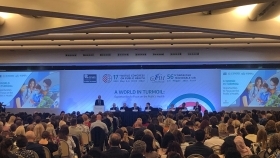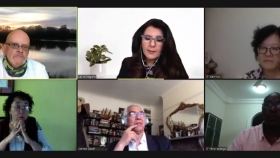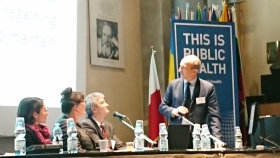
by strengthening education and training
of public health professionals
for both practice and research



The Association of Schools of Public Health in the European Region (ASPHER)
ASPHER is the key independent European organisation dedicated to strengthening the role of public health by improving education and training of public health professionals for both practice and research.Secretariat updates
ASPHER Public Health Emergencies Task Force Statement
Could the continuing Mpox epidemic threat in Africa lead to the next pandemic if urgent global action is not sustained?
part of ASPHER Epidemic Emergencies Lessons Learned Series
13 December 2024
Mohamud Sheek-Hussein, Ariane Bauernfeind, John Middleton, John Reid, Shane Creagh Piper, Vasco Ricoca Friere Duarte Peixoto, Alison McCallum, on behalf of the ASPHER Public Health Emergencies Task Force
Read and download the full statement here.
Mpox is a growing threat, a changing virus, evolving in severity and transmissibility. This zoonotic disease, was first recognised as a global public health threat when the Clade IIb epidemic was declared a public health emergency of international concern (PHEIC) on 23rd July 2022 (1). Global escalation of epidemic countermeasures reduced spread and PHEIC status was discontinued from 11th May 2023. However, mpox is considered endemic in Democratic Republic of Congo (DRC), Liberia, Gabon, Sierra Leone, Cameroon, Nigeria, and the Central African Republic (CAR) with cryptic, sustained human to human infection in parts of Nigeria since 2014 (2) (3).
On August 14, 2024, the World Health Organization (WHO) Director General declared a new PHEIC (4), based on the increase in mpox cases in DRC and rapid spread to neighbouring countries that had not previously reported outbreaks (5). According to recent CDC reporting (6) to date, the global epidemic of clade II mpox has caused more than 100,000 cases in 122 countries, including 115 countries where mpox was not previously reported.
Of particular concern is emergence of a new sub-lineage of the clade I mpox virus (clade Ib) and evidence indicative of ongoing evolution (7). In this new epidemic, two-thirds of cases and 85% of the deaths in DRC, are in children under 15 years old, with infants and young children experiencing an approximately 10% case fatality rate (CFR).
In this statement we revisit our continuing ‘Lessons Learned’ focus on epidemics and pandemics. This builds upon ASPHER’s previous commentary on the first Mpox PHEIC in 2022/23 (8), and on our wider lessons on global preparedness for epidemics from the COVID-19 Pandemic (9). We also view the challenges of this second mpox PHEIC in the context of our recent commentary on the Global Pandemic Agreement (10) where we welcomed progress to date highlighting the need for sustained investment in global early warning systems, prompt public health alerts and co-designed knowledge generation, exchange and application, while noting the depleted public health workforce, requirement for capacity building, and ongoing concern re inequitable access to diagnostics, support, vaccines and countermeasures.
Terms of use · Transparency statement ·Tel: +32 2 735 0890 ·Skype: ASPHERskype ·Mail: office@aspher.org ·Share:
ADDRESS
Aspher SecretariatUM Brussels Campus
Av de l'Armée / Legerlaan 10
BE-1040 Brussels





